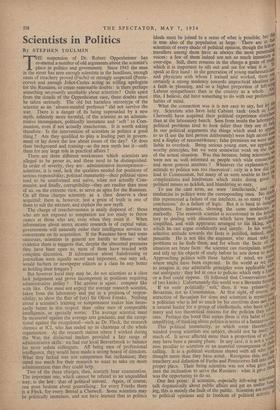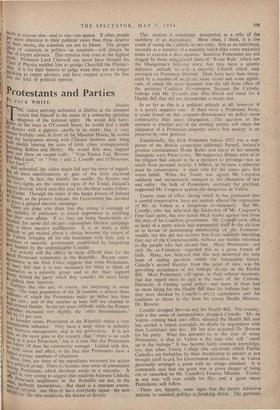By STEPHEN TOULMIN HE suspension of Dr. Robert Oppenheimer has
re-started a number of old arguments about the scientist's place in politics-and government. Since 1945 the man in the street has seen enough scientists in the headlines, enough cases of treachery proved (Fuchs) or strongly suspected (Ponte- corvo) and enough Joliot-Curies acting as willing apologists for the Russians, to create reasonable doubts : is there perhaps something necessarily unreliable about scientists? Quite apart from the details of the Oppenheimer case, these doubts must be taken seriously. The old but harmless stereotype of the scientist as an absent-minded professor' did not survive the war. There is a danger of its being superseded by a new myth, infinitely more harmful, of the scientist as an adminis- trative incompetent, politically immature and soft' to Com- munism, even if not actually treacherous. It is worth asking therefore : Is the intervention of scientists in politics a good thing ? Are they qualified to play a leading part in govern- ment or lay down the law about issues of the day? Or does their background and training—as the new myth has it—unfit them for any large role in practical affairs ?
There are three different weaknesses which scientists are alleged to be prone to, and these need to be distinguished. In order of severity, they are: administrative incompetence— scientists, it is said, lack the qualities needed for positions of serious responsibility; political immaturity—their political views tend to be uninformed and naive, when not actually Com- munist; and finally, corruptibility—they are readier than most of us, on the extreme view, to serve as spies for the Russians. On all these charges scientists as a class deserve a clear acquittal; there is, however, just a grain of truth in one of them to salt the mixture, and explain the new myth. The charge of treacherousness is easily disposed of : those who are not exposed to temptation are too ready to throW stones at those who are, even when they resist it. When information about secret atomic research is of capital value, governments will naturally order their intelligence services to concentrate on its acquisition. If the Russians have had some successes, scientists in general are hardly to blame: what evidence there is suggests that, despite the abnormal pressures they have been open to, most of them have reacted with complete discretion. If information about hairdressing or journalism were equally secret and important, one may ask, would barbers or newspaper editors as a class be any better at holding their tongues ? But however loyal they may be, do not scientists as a class lack judgement and prove incompetent in positions requiring administrative ability ? The answer is again : compare like with like. One must not expect the average research scientist, taken from the laboratory and put in a position, of respon- sibility, to show the flair of (say) Sir Oliver Franks. Nothing about a scientist's training or temperament makes him iteces- intelligence, or specially worse. The average scientist must ' many and too theoretical reasons for the policies they ad be measured against the average arts graduate, and the excep- tional against the exceptional—such as Dr. Fleck, the research chemist at ICI, who has ended up as chairman of the whole organisation. At the research station where I worked during the War, the divisional leaders provided a fair range of administrative skills : we had our local Beaverbrook to balance his more sedate colleagues. All being men of professional intelligence, they would have made a strong board of directors. What they lacked was not competence but inclination; they cared too much for their research to want to take on more administration than they could help. Two of the three charges, then, scarcely bear examination. The important one, which cannot be refuted in an unqualified way, is the last: that of political naiveté. Again, of course, one must hesitate about generalising : for every Franks there is a Fleck, for every Bernal a Cherwell. Some scientists may be politically immature, and not have learned that in politics sarily better in this respect than other men of comparable a natural leader for a group of intellectuals, who have all vo, ideals must be joined to a sense of what is possible; but tld is true also of the population at large. There are ill `"'„ scientists of every shade of political opinion, though the fell0,t travellers among them have as always the most penetrauw, voices: a few of them indeed are not so much immature over-ripe. Still, there remains in the charge a grain of 5111,' which it is important to sift out and see for what it IS ,4P speak at first hand: in the generation of young mathematicia.,u,', and physicists with whom I trained and worked, there llfA certainly a strong tendency towards impractical idealism a?" a faith in planning, and so a higher proportion of left-1 Labour sympathisers than in the country as a whole. 11.1 this, I belieVe, did have something to do with our professieu" habits of mind. What the connection was it is not easy to say, but let 01 try. Scientists who have held Cabinet rank (such as L° Cherwell) have acquired their political experience elsewile, than at the laboratory bench. Seen from inside the laboratm political problems tend to look tidier than they are in 10 In our political arguments the things which used to aP to us (I use the first person deliberately) were high moral t°",; and a display of reasonableness : false premisses we were 111,%1 liable to overlook. Being serious young men, we appis°,u,t1 worthy principles, but we were somewhat weak on the 0'6 of the actual situation. Was this .because, being scientists, lg. were not as well informed as people with wide conneell°`',; and more general interests '1 Whatever the explanation. 1,"'t attitude to politics was too theoretical: only in a few did lakle lead to Communism, but many of us were unable to face t complications and hindrances which make doing good b" ' political means so ticklish, and blundering so easy. To use the cant term, we were intellectuals,' and °111,4 tendeicies in politics were the corresponding ones. No this represented a failure of our intellects, as so many ' conclusions ' do a failure of logic. But it is hard to intagIS; engineers, for instance, showing the same tendencies markedly. The research scientist is accustomed in the labPli tory to dealing with situations which have been artifi::11 simplified, and with apparatus arranged to his liking, ll1)1)5 which he can argue confidently and simply. In his woric., selective attitude towards the facts is justified, indeed, ill11.1y pensable. He is not like the engineer, who must take w problems as he finds them, and for whom the facts 01 nt situation are brute facts: the scientist can manipulate, ar111,.'1:, and tidy up his objects of study before he sets down to vi°4`ed Approaching politics with these habits of mind, we e,11,`',14 where might have been expected. In the world as we t7h, to imagine it, our admirable principles were applicable 0'4 out ambiguity : they led at once to policies which only a 1130 or a fool could oppose. (It followed that Conservatives wcsy, of two kinds.) Unfortunately this world was a Bevanite fall° to If we were politically soft,' then, it was primarily tbo Bevanism, not to Communism. At first sight, of course, s: attraction of Bevanism for dons and scientists is mysteri°,114 a politician who is led so much by his emotions does flat i°00 cate. Perhaps the bond that unites them is this habit of simplifying, of thinking about politics in terms of a fantasy-"'` rv, 'Quell as anyone else—and to one vote apiece. If other people P_aY more attention to their political views than these deserve u! their merits the scientists are not to blame. The proper
,1
of scientists in politics—as scientists—will always be at. of expert advisers. This remains true even at the highest levels' Professor Lord Cherwell can never have thought his of Physics entitled him to grudge Churchill the Premier- 'LHP. It is for their hearers to judge when they are no longer ,. peaking as expert advisers, and have stepped across the line into the field of political opinion.











































 Previous page
Previous page